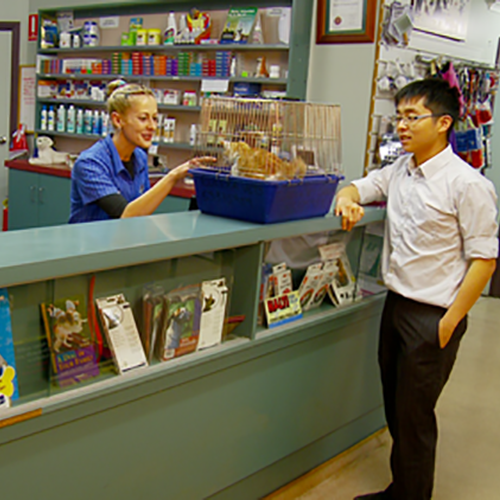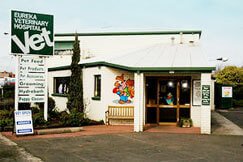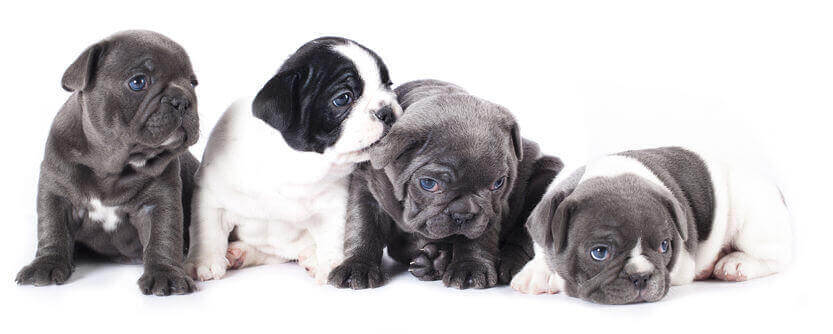After Hours
0408 512 323
What to Expect Before and After Surgery
Supporting your pet every step of the way
Whether your pet is coming in for a routine procedure like desexing or dental work, or undergoing major orthopaedic surgery, we’re here to guide you through the process and ensure your pet has the safest, smoothest experience possible.
Many owners feel nervous about anaesthesia — and while there are always some risks involved, please be reassured that our experienced vets and nurses at Eureka Veterinary Clinic take every precaution to keep those risks to a minimum. We're always happy to answer your questions.
The night before surgery
- No food after 8:00pm the night before your pet’s procedure.
- Water is allowed and should remain available until the morning.
- Rabbits and guinea pigs must NOT be fasted. They should have access to food and water at all times.
On the morning of surgery
- Please allow your pet to go to the toilet before arriving at the clinic.
- Bring your pet to the clinic between 8:00am and 9:00am.
- Make sure your pet is up to date with their vaccinations — this helps protect all animals in hospital.
If your pet has not had a recent health check or vaccination with us, a pre-anaesthetic consultation may be required before surgery.
Hospital admission process
Please allow 15 minutes for check-in. During this time, our nursing team will:
- Confirm your contact details
- Review the surgical plan with you
- Discuss any pre-anaesthetic blood testing or extras you would like (e.g. microchipping, nail trim)
- Have you sign a surgical consent form
📞 It’s essential that we can reach you throughout the day, so please keep your phone nearby in case we need to speak with you about your pet.
What we do to keep your pet safe
At Eureka Veterinary Clinic, all pets undergoing general anaesthesia receive:
- IV catheter placement for emergency access and fluid delivery
- Intravenous fluids during surgery to maintain hydration and blood pressure
- Monitoring by trained staff using advanced equipment (including pulse oximetry, capnography, and blood pressure monitoring)
In older pets or those with underlying conditions, ongoing IV fluid therapy during recovery may be recommended. Your vet will discuss this with you on admission.
We also offer pre-anaesthetic blood testing, which helps us check how your pet’s liver and kidneys are functioning — these are the organs responsible for processing anaesthesia. While optional, this test gives us vital information to reduce risk and customise the anaesthetic plan to your pet’s needs.
After surgery
Most pets go home the same day once they are fully awake, comfortable, and safe to be discharged. One of our nurses will talk you through:
- How the procedure went
- What medications (if any) your pet needs
- Aftercare instructions (rest, feeding, exercise restrictions, etc.)
- When to come back for a post-operative check-up (usually 10–14 days later)
We’re always available to answer questions after discharge — please don’t hesitate to call us if you’re unsure about anything during recovery.
📞 For questions about your pet’s upcoming surgery, or to book a consultation, please call us on (03) 5333 5959
We’re here to help you and your pet feel supported at every stage.
Before the operation
Your pet is weighed to ensure accurate drug doses. A pre-anaesthetic drug is given which reduce anxiety, provide mild sedation and pain relief. Your pet will then be kenneled with a comfortable bed until the pre-med takes effect.
Collecting your pet
Most pets undergoing a routine or minor surgical procedure will be up-and-about and ready to walk out the door in the afternoon on the same day. Most will be discharged after 4.30pm to allow ample time to recover from the anaesthesia. All patients will receive pain relief before and after the procedure.
In the case of major surgical procedures, because prolonged pain relief and monitoring is required, they will remain in hospital overnight to ensure they are kept comfortable.
On arrival at the clinic to collect your pet, although you will be keen to see your pet, it is advisable that you speak to the vet or nurse beforehand. This enables our staff to give you all the necessary post operative information and instructions you need without being distracted. It is also a perfect time to ask any questions you may have about the procedure. You can also settle the bill and organsie any check up appointments your pet may need.
The first night home
Your pet needs to be kept indoors and warm. After an anaesthetic and surgical procedure, animals can be slow at regulating their body temperature.
They should be offered food and water, but do not be alarmed if your pet does not eat much that evening. They should resume a normal appetite within 48 hours.
Exercise should be restricted to leash walking only unless your vet has given your specific exercise instructions. Overactivity is a leading cause of swelling at the surgical site.
What next:
You must follow the instructions in the discharge notes.
If given medications, ensure your pet gets these at the appropriate time as per the instructions on the label.
If your pet licks at the surgical site, an Elizabethan collar (or ‘bucket’) maybe required if they have not already been given one by the staff.
Monitor the surgical site on a daily basis. If there is any swelling, discharge or your pet appears distressed, you MUST contact the clinic.
Animals have different pain thresholds and they show pain in different ways. For example, dog may whine, cry or limp in an obvious way, cats and small animals such as rodents may become withdrawal and stop eating. The vets are aware of pain and do whatever we can to minimise the pain by providing pain relief, however, if you are concerned then you must contact us for advise.
For rabbits it is vital that they start eating as soon as possible when you bring them home, you may need to syringe feed a special recovery diet if they do not eat. If your rabbit is not eating the day after the anaesthesia, you must contact the clinic.
Post-operative care basics
- Your pet may be drowsy for a limited time. Ask the vet or nurse what to expect so you know what is normal.
- Make sure you have the home set up before your pet comes home. Provide them with a comfortable bed away from draughts and noise. Don't let young children and other animals disturb them.
- Your pet may be slightly nauseous after the anaesthesia. Light palatable meals, given little and often can help. Occassional vomiting can be normal, but contact the clinic if you are concerned.
- Exercise should be restricted for at least 24 hours. Make sure you follow the post operative notes on exercise, especially after orthopaedic surgery.
- Check any wounds daily. There is usually no need to bathe the wound but it is important to prevent your pet licking at it. Licking nad chewing can lead to the wound becoming infected and becoming damaged. It may result in antibiotics for your pet and if the wound opens up, further surgery may be required. If you think your pet will lick the wound then it is better to request your pet goes home with an elizabethen collar. Prevention is better then cure. If the wound looks, red, swollen or infected, contact the clinic.
- Bandages must be kept clean and dry. they must be check daily for signs of swellings, seepage, discharges, unpleasant smells e.t.c. and if this happens, contact the clinic.
- Make sure you give any medication as per the instructions and that you finish the course.
- Remember, if you have any concerns, then contact the clinic.
CLICK HERE for available times and bookingsBOOK ONLINE >
Location




